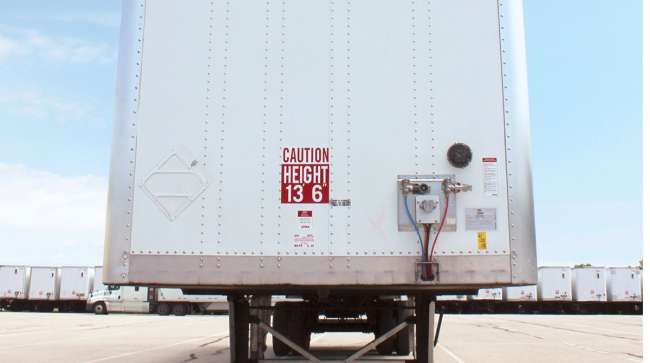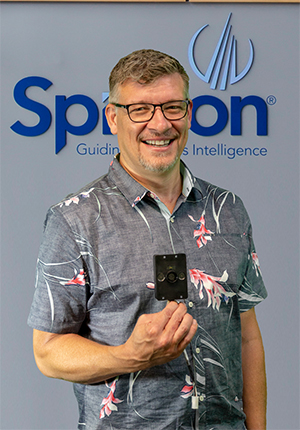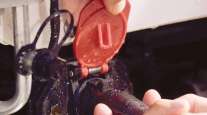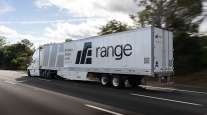Carriers, Suppliers Work to Boost Utilization of Cargo Sensors

The use of cargo sensors with trailer tracking is on the rise, suppliers said, while motor carriers work to improve utilization and boost driver satisfaction with the technology.
Knowing what trailers are loaded is needed regardless of market conditions; however, as the market tightens, greater accuracy is needed, said Shaleen Devgun, chief information officer at Green Bay, Wis.-based Schneider, which ranks No. 6 on the Transport Topics Top 100 list of the largest for-hire carriers in North America.
Schneider has used cargo sensors since 2004, and the information they provide is integrated into the company’s planning systems. It teamed up with SkyBitz earlier this year to implement Schneider’s third-generation trailer and container tracking system. “Timely and accurate location and cargo status is key to ensuring reliable trailer assignments and pool management,” Devgun said.
Henry Popplewell, president of SkyBitz, said that about 60% of the company’s trailer tracking customers deploy cargo sensors today, up from 8% to 10% when the technology was introduced.
He said that the sensors drive utilization, even in well-run operations, which is taking greater importance as capacity tightens. “Most of our customers’ trailers are idle 10 to 11 days a month but for those customers that also deployed a cargo sensor that drops down to eight to nine, which is a 20% improvement in utilization.”
Roni Taylor, vice president of strategy and business development at Spireon, said that traditionally, only the largest fleets saw the value in cargo sensors. “Now we’re seeing fleets of all sizes want to know the load status,” Taylor said.
Shippers often will move carriers with cargo sensor technology to the front of the list because they know they will bill for detention time, Taylor said. “Trucking companies don’t want to bill for detention, they just want to get them unloaded and back out on the road,” she said.
Spireon recently introduced a new FleetLocate cargo sensor with its IntelliScan sensing technology that uses a combination of sensing methods, including optical imaging and laser time of flight, to provide a more precise picture of a trailer’s contents. Reza Hemmati, Spireon’s senior director of product management, said the use of optical imaging paves the way for potential future enhancements that support photo capture or real-time visualization of trailer contents.
Christian Allred, senior vice president of international at Orbcomm, which provides trailer tracking and cargo sensor technology, said that carriers are only making money if trailers and containers are being used, so they’re looking for every opportunity to speed the cycle. Hub Group, for example, has set up a geofence around Home Depot, and gets an alert that the trailer has been delivered, an alert when the doors open and an alert when the trailer is empty, Allred said.
“It allows users to make a much quicker turn. Before they had to wait for the store to call them and tell them the transport unit had been unloaded and they could pick it up,” Allred said, adding that combining technologies can give carriers an end-to-end view of complex transport chains and improve the hand-offs between the different parties.

Rick Gruenhagen, Spireon's chief technology officer, shows the company's FleetLocate cargo sensor with IntelliScan technology. (Spireon)
Meanwhile, Xtra Lease is now including cargo sensors from SkyBitz on all new dry van trailers in its network to help its customers drive productivity, said Steve Zaborowski, senior vice president at Xtra Lease. “There is very tight capacity,” he said. “Truck utilization is high. There is a serious shortage of drivers in the industry.”
“We’re in an information age, and companies and managers need information to make themselves competitive,” Zaborowski said.
SkyBitz cargo sensors use three ultrasonic beams that can pick up objects 3-feet by 3-feet anywhere in a trailer. The devices are solar charged and designed to last the life of the trailer.
Without cargo sensors, someone has to call a shipper or consignee location to determine if a trailer is loaded or unloaded, Zaborowski said. “It saves the shipper and the transporter a lot of time,” he said. “That saves the driver time.”
Gerry Mead, executive director of innovation for Phillips Industries, said having more data helps carriers create better models that can increase their predictability. Cargo sensing can help support blockchain and the concept of a single distributed ledger, which can be particularly useful in the case of a recall, he said.
Phillips Industries, which offers ultrasonic sensors with its TrailerNet and ChassisNet products, is testing technology that places an ultrasonic sensor on the outside of the trailer. “It is like an ultrasound that is used to diagnose certain medical conditions,” Mead said, noting that this technology, however, is “going through a trailer body to see inside.”
Cargo sensors also can help create fuel savings and boost driver retention. “When we have errors in trailer assignments, it drives nonbillable miles to drive to alternate trailer locations, which increases driver frustration, which can impact turnover,” Schneider’s Devgun said, adding that the cost of a reassignment is significant and the impact on driver turnover is “unquantifiable.”
Ron Hall, vice president for equipment and fuel at Salt Lake City-based C.R. England, said the carrier has been interested in pursuing cargo sensors to bolster its current trailer detention processes and improve trailer utilization but hasn’t found the ideal solution. Hall said the optical sensors used in the dry-van business don’t work in reefers because the lens gets clouded. C.R. England ranks No. 26 on the TT 100.
C.R. England is getting closer to a positive ROI on air bag sensing technology, Hall said. “In our last review, about a year ago, we were getting close to break-even.”
Matt Harris, senior vice president and general manager of Asset Intelligence, an I.D. Systems company that offers the VeriWise trailer tracking system, said sensors also can increase security by helping fleets rapidly identify unexpected or unauthorized unloading activity outside of geofences and known/expected locations.
I.D. Systems’ ultrasonic cargo sensor uses multiple transducers to detect cargo anywhere in the trailer and can detect a single pallet as well as low-profile loads. The company plans to introduce new solutions and sensors in the fall that will provide more visibility into the container, such as how much is loaded and if it is secured, Harris said.
While today’s solutions meet the needs of dry van, flatbed and bulk trailers, several providers said they’re still working on solutions for the refrigerated industry. Harris said sound waves can change based on temperature and humidity, which can disrupt the baseline that ultrasonic cargo sensors use. Also, the walls in multitemp reefers interfere with the signal.
Spireon is testing its latest sensor in single-compartment refrigerated trailers, Taylor said.




